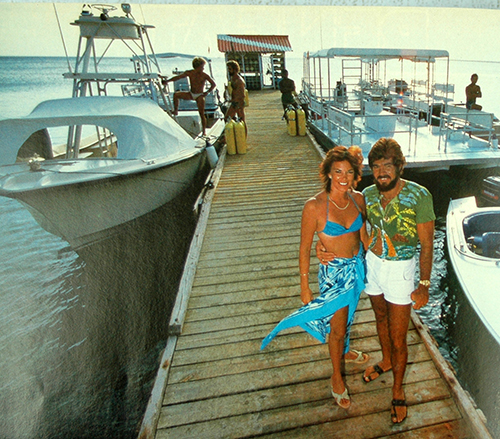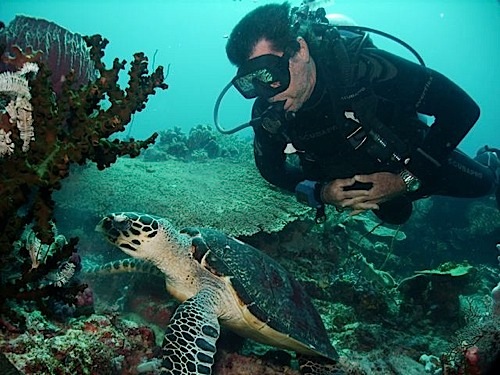Miscellaneous Blogs
Scubaverse Interviews Diving Legend Peter Hughes
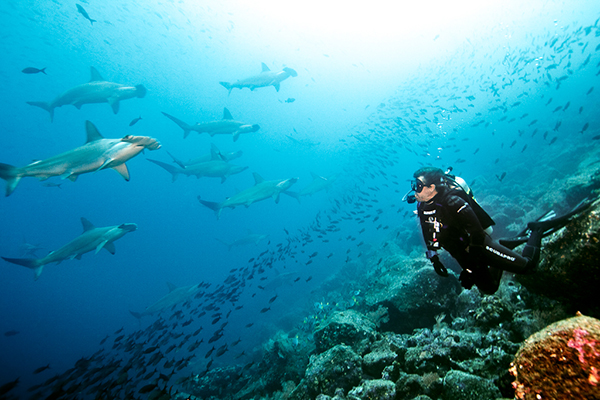
Scubaverse.com’s Jeff Goodman Interviews Diving Legend Peter Hughes
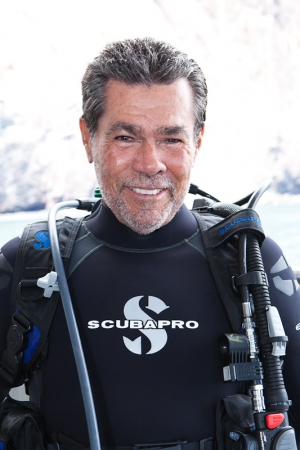 The accolades for Peter Hughes are endless. In 2011 Peter received the DEMA Reaching Out Award for helping to evolve the liveaboard diving industry over the past three decades. Also after spending more than 25 years building his former liveaboard company, Peter Hughes Diving Inc. (now known as Dancer Fleet), he created a new project, the DivEncounters Alliance. This year, Peter was inducted into the International Scuba Hall of Fame.
The accolades for Peter Hughes are endless. In 2011 Peter received the DEMA Reaching Out Award for helping to evolve the liveaboard diving industry over the past three decades. Also after spending more than 25 years building his former liveaboard company, Peter Hughes Diving Inc. (now known as Dancer Fleet), he created a new project, the DivEncounters Alliance. This year, Peter was inducted into the International Scuba Hall of Fame.
I asked Peter when it was and why he first became interested in the sea and diving.
Peter: My family immigrated to Trinidad in 1951 – I had my 4th Birthday on the ship during the crossing. I learned to swim at that age and by the time I was 7 years old I had been introduced to snorkelling – using goggles, nose clip, long Aluminium S-shaped snorkel with rubber cage & ping pong ball at end, and ‘flippers’! That was it for me!! I never looked back. On my 10th Birthday my father gave me The Silent World by Jacques Cousteau and after that all I ever wanted to do was to dive.
Jeff: What influenced you into creating your first scuba business?
Peter: As I was never much “into school” I figured diving would be a good way to go after I basically graduated high school (the British equivalent – GCE “0” Levels). After a short stint as a commercial diving apprentice in Trinidad (one year only) I went to work for Texaco Trinidad, Inc. as an apprentice oil field production engineer. I resigned from that position after three years and at 21 years old moved to Tobago to work at Camp Crusoe, a water sport summer camp for teenage boys (13 – 18 years old), and after the boys eight week sessions, girls at the same age – teaching scuba diving, spear fishing (freediving only), sailing, water skiing, rowing, etc.
Camp Crusoe (I was Camp Director at the time) closed at the end of 1971 due to political unrest in Trinidad in 1970/71 and from there I went to Roatan where I started the Dive Shop in earnest, basically converting Anthony’s Key Resort from a failing sailing resort into the successful dive resort it still is today.
I met my wife there in 1972 and we were married (in Kansas City) in 1975. We then moved to Bonaire and started a new dive shop operation there – Teach /Tour Diving (Bonaire,) N.V. – at the Flamingo Beach Hotel for the US company Teach/Tour Diving, Inc. out of Nazareth, Pennsylvania.
Teach/Tour Diving, Inc went bankrupt in early 1977 and my wife and I were able to “obtain the assets” of Teach/Tour Diving (Bonaire,) N.V. by way of a court action and started our first company Dive Bonaire, N.V.
Jeff: Having once created your businesses, what kept you going the most? – the desire to make your enterprises successful, a love of the oceans, sharing a passion for diving? What drives you on?
Peter: Once we realized the appreciation others had for the ocean/reefs etc we just wanted to keep on making the experience available to as many as possible, and Bonaire was the perfect place for that – we eventually sold our business to Divi Resorts, N.V. (the publically traded company – AMEX – at the time) in 1985 and I signed a five year employment contract along with a non-compete agreement. I worked for Divi Resorts, N.V. for five years (as contracted) as Vice President Marine Sports Division and was tasked with building dive shop operations at all Divi Resort, N.V. properties throughout the Caribbean. That was an exciting & very rewarding period of my life.
At the end of the five year employment contract I resigned (very amicably) and continued to honor my non-compete. My wife (Alice) and I started our liveaboard business Jan. 1991 with the liveaboard dive vessel M/V Sea Dancer that we ‘purchased’ as part of my separation agreement from Divi Resorts, N.V. The rest is history.
Jeff: The diving industry has evolved immensely since the 1960s, and in many ways. New technologies, ease of travel, and increased disposable income have all contributed to more people scuba diving and travelling to do so. What has been the most noticeable change for you?
Peter: For sure there have been many positive changes in the dive industry over the past 45+ years – many good, but also unfortunately, some not so good. I hate to be a ‘black cloud’ but the deterioration our oceans & reefs is of major concern to me as the world moves forward, seemingly without concern.
I feel concern that we see many ‘certified’ divers showing up that lack the necessary skills for certain of the more challenging open water conditions and they can easily prove to be a hazard to themselves as well as to others.
The dive industry itself does not, in my humble opinion, seem to be growing as it should be – I worry our retention rate is not what it should be and that our loss of participation is pretty much on par with our gains.
As aforementioned, I hate to be a ‘black cloud’ but do sometimes feel the need to be realistic and express my concerns honestly.
Jeff: Along with over fishing and pollution, pressure from recreational scuba diving has also taken a major toll on reefs and other marine ecosystems. Do you think this trend is finally turning and people are becoming more aware of the fragility of our seas?
Peter: I touched on this above – over fishing of any kind is a MAJOR concern, but the onslaught against sharks, and now even more worrisome due to much slower reproductive cycle, the onslaught against Manta/Mobula Rays, is horrifying!!! Pollution of any kind is of grave concern, but most urgently is our inability to keep ‘plastics’ out of our oceans & waterways.
Again, only in my opinion, I see ‘pressure from scuba divers’ as the most minimal of problems facing our oceans today – sure we have inconsiderate or poorly trained divers causing damage to sensitive reefs etc, but I like to think they are in the minority. Scuba Divers are the world’s ‘eyes’ to what is happening, and as such need to be the world’s ‘mouth’ too and SCREAM out their observations & concerns to EVERYONE involved.
Jeff: Do your enterprises incorporate any conservation codes and if so, how are you enforcing them?
Peter: As the President or CEO (whatever my title may have been at Peter Hughes Diving, Inc. / Dancer Fleet) I had full control over the operations of the vessels in the fleet and particularly those that I (and the bank) owned, so yes, we did what we could to minimize our impact wherever we operated. We hired locally wherever possible, we supplied locally wherever possible, we bunkered locally, we spent tens of thousands (probably more like hundreds of thousands) of dollars over my career installing, maintaining & repairing permanent moorings – which immediately became the property of the state once installed and therefore available to all – first come first served – with the only ownership being retained by the installer (my company) being the LIABILITY! Needless to say, regardless of which vessel may have caused damage to any mooring, we were always quick to fix it due to this ‘quirk’ in the law. We had stringent sewage disposal protocol, bagged all garbage on board to bring back to shore to be properly disposed of, we offered free buoyancy control workshops every week – Zen Diving – and offered seminars on REEF Etiquette too– REEF Patrol etc.
Today, the vessels operating as part of the DivEncounters Alliance are all individually owned & operated and I have ZERO vested interest in any of these vessels – these independent owners are all conservationists at heart and operate accordingly as after all, their very business success depends on it.
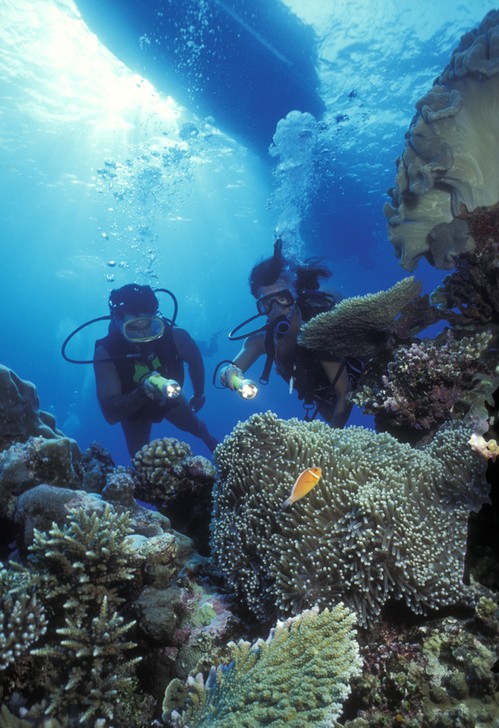 Jeff: One of my personal frustrations with any dive operator, especially those who display the ‘eco friendly’ badge, is that they serve sea food on their boats and resorts. When I ask why and where the fish etc. comes from I nearly always get the answer that it is sustainably sourced from another area. When I ask where from and why is it sustainable, I get the generic blank look. In my opinion there are very few if any sustainable wild fisheries that allow species to thrive. Some farmed species do lend themselves to eco friendly production. Do you have any policies or thoughts on this?
Jeff: One of my personal frustrations with any dive operator, especially those who display the ‘eco friendly’ badge, is that they serve sea food on their boats and resorts. When I ask why and where the fish etc. comes from I nearly always get the answer that it is sustainably sourced from another area. When I ask where from and why is it sustainable, I get the generic blank look. In my opinion there are very few if any sustainable wild fisheries that allow species to thrive. Some farmed species do lend themselves to eco friendly production. Do you have any policies or thoughts on this?
Peter: Again I have to be a realist and sometimes that means we have to see the big picture around us – we cannot lose sight of the forest for a tree! We are all conservationists at heart; as aforementioned, our business success depends on it but likewise, our business success – and we are in business with HUGE investments in the vessels – we are not NGOs or other charitable organizations. Some reasonable ROI is essential & quite justified, so with that being understood, we must give our guests what they expect whenever we can – and being “in the tropics” for many that expectation is “fresh sea food!” If the fresh sea food is purchased locally, from local fishermen operating within the laws of their country, I see no fault in buying their products, and in fact used to encourage my Captains & Chefs to do so whenever possible – buy local!!
When a good, reliable local source was not available then farmed sea food was utilized – amazing Tilapia and Shrimp etc available in countries like Ecuador / Galapagos for example.
Jeff: It was always thought that fish and other marine animals do not feel pain and other emotions such as fear and a great will to live. This has now been proved otherwise. Have you been able to witness any of these behaviours in marine animals when diving with them?
Peter: This is tough to know – fish and marine creatures (other than mammals) are cold blooded – do they feel pain and know fear? I do not know. What I do know however, is that all creatures have a survival instinct and all are equipped with some means of defence mechanism but as we also know, not all defence systems are fool proof and the ocean can be a cruel place with just about every creature in there being predated upon by another with the Great White Shark perhaps being at the top of the food chain – but even he/she can be predated upon by the mighty Killer Whale, the same creature that can round up gigantic Sperm Whales just to eat their tongues and then leave these magnificent creatures to die; how much fear, how much pain is felt in the process? I cannot begin to know.
This is the realism of the “wild kingdom” whether in the ocean or on the land, is it not?
Jeff: Is diving for you today as exciting and fulfilling as it was in the early days of your career? What do you love about it most?
Peter: I no longer feel I need to dive every day or do three/four dives per day, but diving is still VERY special to me – Diving (deeper is better) is my quiet time, my “my” time when I can just float silently & weightlessly and observe around me as life continues (seemingly without me). It is a time when pleasant thoughts wander aimlessly through my mind and the smiles that come to my face sometimes cause my regulator to leak – it is “my” time when time seems to stop, even if only for an hour …
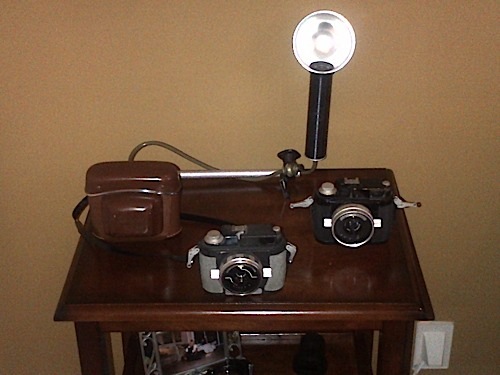 Jeff: One of the modern aspects of diving is the ability of everyone to take good underwater photos and video. Small and cheap cameras allow every diver to take some sort of image to remember their dive by. I well remember my first professional camera was a Bolex wind-up clockwork film camera with no exposure metering, no through the lens viewing and only a 2 minute run time before having to surface to change magazines. Do you think the ability now for everyone to take images has changed the way they dive and perceive the marine world in which they are visiting?
Jeff: One of the modern aspects of diving is the ability of everyone to take good underwater photos and video. Small and cheap cameras allow every diver to take some sort of image to remember their dive by. I well remember my first professional camera was a Bolex wind-up clockwork film camera with no exposure metering, no through the lens viewing and only a 2 minute run time before having to surface to change magazines. Do you think the ability now for everyone to take images has changed the way they dive and perceive the marine world in which they are visiting?
Peter: The last camera I owned (still have it) is a Calypso (precursor of the Nikonos) and I too fiddled with a Bolex Housing & Camera for a short time while working in Tobago (1968 – 1971) but after that period I became far too busy trying to build the dive shop(s) I was tasked with managing (and later owning) and taking care of my divers to fiddle with cameras, so just simply stopped. Sometimes I wish I had kept at it but today, maybe not so much – today there seems to be a general lack of talent needed to get good photos what with digital – shoot as many images as you want of any subject, look at the image (delete too) as you shoot as opposed to just having 24 or 36 exposures and then the development process to see what you got – and now, it seems everyone has not only an U/W camera but a laptop with programs to completely alter the image after your are back, sitting comfortably with a Rum & Soda at your computer – that kind of takes the challenge of nailing that one “keeper image” out of it for me.
BUT, the more beautiful images taken & shown by divers to others is a wonderful thing – the ‘eyes’ of the world so that others may see/know what is down there and why it is so important that we take very good care of it!!
Jeff: Would you have any advice for a young person wanting to start a dive business either on land or a Liveaboard?
Peter: Be sure you know exactly what you are getting yourself into and make very, very sure you understand the laws, permitting processes etc, work permit opportunities, importation laws etc. of the destination of your choosing…
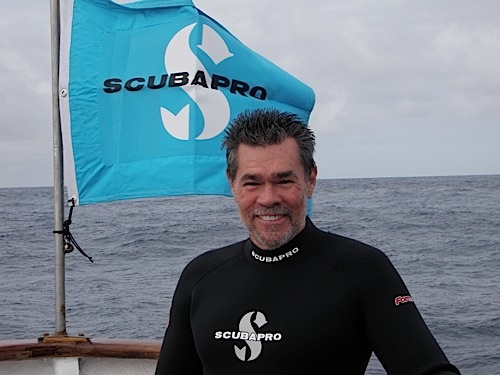 Jeff: If you could leave a lasting legacy or message to all future divers, what would it be?
Jeff: If you could leave a lasting legacy or message to all future divers, what would it be?
Peter: The world is nothing without our vibrant, healthy, living oceans and we are quite literally, I think, killing them! If we do not stop the destruction and immediately start reversing our direction what we will leave our grand kids (I have no kids) will not be what we have, what we know and what we love – and that is just not acceptable!
Jeff: Thanks Peter. I look forward to meeting you one day. Good diving.
Peter: Thanx for the opportunity – look forward to meeting you some day and as always … keep an ocean mind.
Blogs
The BiG Scuba Podcast Episode 173: DEEP – Making Humans Aquatic
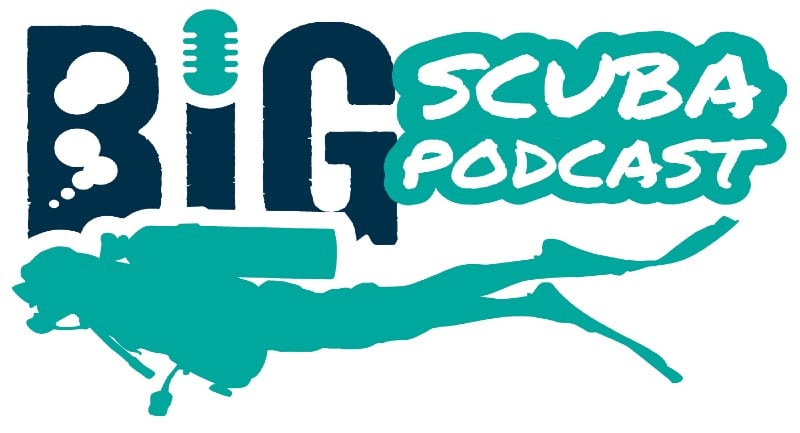
Gemma and Ian visited DEEP and were hosted by Phil Short, Research Diving, Training Lead, and were given a tour of the facility at Avonmouth and then over to the Campus at Tidenham.
DEEP is evolving how humans access, explore and inhabit underwater environments. Through flexible, modular and mobile subsea habitats that allow humans to live undersea up to 200m for up to 28 days, work-class submarines, and advanced human performance research, DEEP completely transforms what we are capable of underwater and how we conduct undersea science and research.
You can listen to Episode 173 of the BiG Scuba Podcast here.
We hope you have enjoyed this episode of The BiG Scuba Podcast. Please give us ★★★★★, leave a review, and tell your friends about us as each share and like makes a difference. Contact Gemma and Ian with your messages, ideas and feedback via The BiG Scuba Bat Phone +44 7810 005924 or use our social media platforms. To keep up to date with the latest news, follow us:
We are on Instagram @thebigscuba
We are on Facebook @thebigscuba
We are in LinkedIn https://www.linkedin.com/in/ian%F0%9F%A6%88-last-325b101b7/
The BiG Scuba Website www.thebigscuba.com
Amazon Store : https://www.amazon.co.uk/shop/thebigscuba
Visit https://www.patreon.com/thebigscubapodcast and subscribe – Super quick and easy to do and it makes a massive difference. Thank you.
Blogs
The BiG Scuba Podcast Episode 172: Dr. Joseph Dituri
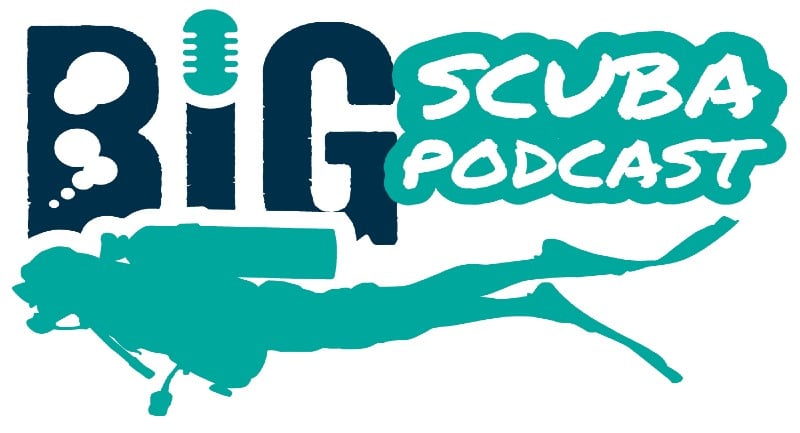
Gemma and Ian chat to Dr. Joseph Dituri. Dr. Jospeh Dituri lived undersea for 100 Days in a mission combining education, ocean conservation research, and the study of the physiological and psychological effects of compression on the human body.
Dituri enlisted in the U.S. Navy in 1985. He served continuously on active service upon various ships and shore stations where he was involved in every aspect of diving and special operations work from saturation diving and deep submergence to submersible design and clearance diving. Now that he is retired from 28 years of active service to the United States, he is the president of the International Board of Undersea Medicine. He also volunteers his time as the CEO of the Association for Marine Exploration. He is an invited speaker on motivational, sea and space related topics.
Fuelled by his passion for exploration, discovery, adventure, and making the greatest possible positive contribution to the world, he is fighting for change in a big way and with great enthusiasm.
You can listen to Episode 172 of the BiG Scuba Podcast here.
We hope you have enjoyed this episode of The BiG Scuba Podcast. Please give us ★★★★★, leave a review, and tell your friends about us as each share and like makes a difference. Contact Gemma and Ian with your messages, ideas and feedback via The BiG Scuba Bat Phone +44 7810 005924 or use our social media platforms. To keep up to date with the latest news, follow us:
We are on Instagram @thebigscuba
We are on Facebook @thebigscuba
We are in LinkedIn https://www.linkedin.com/in/ian%F0%9F%A6%88-last-325b101b7/
The BiG Scuba Website www.thebigscuba.com
Amazon Store : https://www.amazon.co.uk/shop/thebigscuba
Visit https://www.patreon.com/thebigscubapodcast and subscribe – Super quick and easy to do and it makes a massive difference. Thank you.
-

 News3 months ago
News3 months agoHone your underwater photography skills with Alphamarine Photography at Red Sea Diving Safari in March
-

 News3 months ago
News3 months agoCapturing Critters in Lembeh Underwater Photography Workshop 2024: Event Roundup
-

 Marine Life & Conservation Blogs3 months ago
Marine Life & Conservation Blogs3 months agoCreature Feature: Swell Sharks
-

 Blogs2 months ago
Blogs2 months agoMurex Resorts: Passport to Paradise!
-

 Blogs2 months ago
Blogs2 months agoDiver Discovering Whale Skeletons Beneath Ice Judged World’s Best Underwater Photograph
-

 Gear Reviews2 weeks ago
Gear Reviews2 weeks agoGEAR REVIEW – Revolutionising Diving Comfort: The Sharkskin T2 Chillproof Suit
-

 Marine Life & Conservation2 months ago
Marine Life & Conservation2 months agoSave the Manatee Club launches brand new webcams at Silver Springs State Park, Florida
-

 Gear Reviews3 months ago
Gear Reviews3 months agoGear Review: Oceanic+ Dive Housing for iPhone


